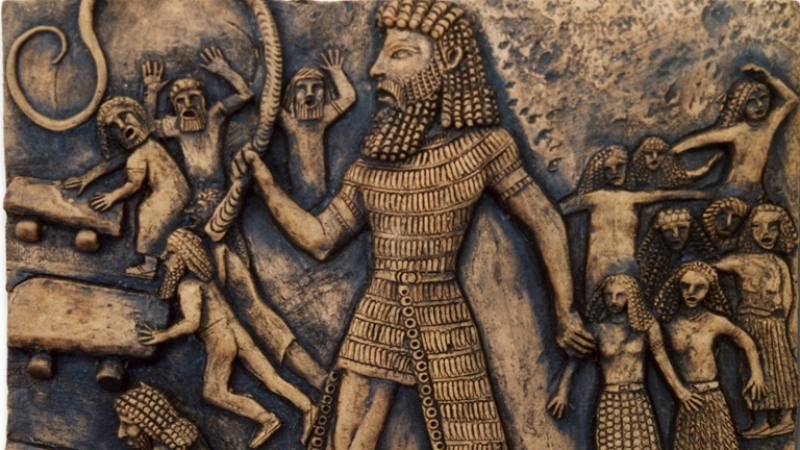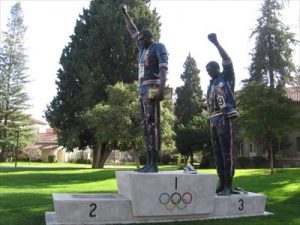Imagine grasping eternal life in your hands just to watch it disappear before your eyes. Or imagine that the hardest journey of your life is finally over and you have failed to obtain the very thing you wanted most. Our story begins in a land known as Mesopotamia about four thousand years ago. There one of the earliest cities in history existed, called Uruk, which lies on the Euphrates river near the Persian Gulf. This city became famous for being the site of one of the earliest piece of literature ever created, The Epic of Gilgamesh. Although in this story Gilgamesh, the hero, is the king of Uruk, he is also partly a god. He is one part mortal and two parts divine, and as such, he was a being full of beauty and courage, but also as terrifying as a wild bull.1 The Epic of Gilgamesh is an adventure story with many exciting parts. However, one of the central themes of the epic revolves around Gilgamesh’s search for immortality.2

Gilgamesh’s quest for everlasting life begins when his friend Enkidu unexpectedly dies. The trauma from losing his dear friend scares Gilgamesh. Enkidu isn’t just a dear friend to Gilgamesh, Enkidu is like a brother to him. The gods had originally created Enkidu to help stop Gilgamesh from stirring up trouble, but after they met, they got along so well that they became brothers and went on countless journeys together. With Enkidu’s death, Gilgamesh is so terrified by the idea of death that he goes on a long journey to beat the inevitable. On this journey he meets several people who tell him that his journey is pointless and that he won’t find what he is searching for. But Gilgamesh doesn’t listen, and pushes forward regardless of what people say. He is so determined to find Utnapishtim, the only human who had been made immortal, but doing so he ignores what his body really desires, sleep. He completely exhausted himself to the point where he was near dying.
After a long and dangerous journey, Gilgamesh finally meets Utnapishtim, who tells Gilgamesh, “There is no permanence. Do we build a house to stand forever, do we seal a contract to hold for all time?…. When the Anunnaki, the judges, come together, and Mammetun the mother of destinies, together they decree the fates of men. Life and death they allot but the day of death they do not disclose.”3 Even with the wise information that Utnapishtim tells him, Gilgamesh is still in pursuit of immortality, so Utnapishtim decides to put him up to a test. The test requires him to stay awake for six days and seven nights, but Gilgamesh ultimately fails the test. Utnapishtim had a kind heart and told him that, instead of obtaining immortality, he might obtain youthfulness. There was a plant in the sea that can restore one’s youth. So of course Gilgamesh doesn’t hesitate in jumping in to find this plant. He finally gets the key to youthfulness, and decides to rest and relax, because he believes his troubles are over. With his guard down, a snake snatches the plant away from him and the plant is gone forever.
Gilgamesh finally accepts this fate, and goes back to the land of Uruk. Although he never got immortality, he did get what he needed. Throughout the story the same line recurs about what is he suppose to do after Enkidu’s death, which is just to live his normal, mortal life.4 Once he returns, he writes on a wall the story of his long journey for immortality. The world may never know if there was a real living, breathing ruler named Gilgamesh, but at least for now we have a legendary one that will last forever.
- Jerry Bentley, Herbert Ziegler, and Heather Streets Salter, Traditions & Encounters: A Brief Global History Volume 1. 4th edition (New York: McGraw Hill, 2015), 5. ↵
- Tzvi Abusch, “The Development and Meaning of the Epic of Gilgamesh: An Interpretive Essay,” Journal of the American Oriental Society 121, no. 4 (2001): 614. ↵
- Nancy K. Sanders, The epic of Gilgamesh (Harmondsworth, Middlesex: Penguin Books, 1964), 23. ↵
- Nicola Vulpe, “Irony and the Unity of the Gilgamesh Epic,” Journal of Near Eastern Studies 53, no. 4 (1994): 280. ↵



93 comments
Natalia Flores
Gilgamesh’s story is very deep when it comes to mourning and death. It really looks into the humanly fear of death and the risks we take to avoid it. It also incorporates the power of sorrow and mourning since he didn’t get over his friend’s death which led to his fear of death. This article really told his story in a flowing way that was easy to understand.
Constancia Tijerina
Gilgamesh’s journey to immortelles I found very intriguing. This article holds a very interesting tale of how he journeys with his friend to find a certain thing to gain this immortality. Over all, this reading was a important aspect of History during the Mesopotamian era and how they are starting to expand their route and journeying to different lands and new findings. This also puts into perspective of how history is based upon story telling and legends that have been passed on to our century.
Vanessa Tombo
A captivating article about a man who attained what he wanted though words. Though Gilgamesh eventually ceased to exist in a physical form he is still alive through words in manuscripts, books, and most importantly internet. This article made me gain a deeper understanding that we all have but one life to live so live and death is inevitable. I also learned to appreciate the power of words and how they live on even after we have left the world. Words are immortal.
Julian Aguero
I found your article to be very interesting and informative. The history of Gilgamesh really gets my attention because of how old the epic is and how it’s not the typical hero story. I also enjoy the bond between Enkidu and Gilgamesh and how complex their relationship is and how important Enkidu is to Gilgamesh in regard to becoming a better man and king. It is interesting that this is one of the first pieces of literature created; teaching us about being content with death. In my eyes it seems that our human species has always been obsessed with death and we truly know there is no way around it. Gilgamesh is not like a regular human being but we see a lot of our selves in Gilgamesh. He can be an inspiration to many because of how he had to slowly learn to become a better person just like everyone else.
Justin Garcia
The Epic of Gilgamesh is interesting to say the least. It is a great tale about learning that youth isn’t eternal and that death is something that can’t be eliminated but rather only prolonged. The article did a great job at delivering a summary to readers that have never read it. Overall this was a well thought out article.
Evelin Joseph
I have always heard about the Epic of Gilgamesh, so to finally learn more in depth about it was great! It is surprising to learn that Gilgamesh starts his whole journey due to the loss of his best friend and his fear of the same happening to him. It seems really devastating that Gilgamesh did not attain immortality and right when he was about to gain youthfulness, it was snatched right out of his hands. This story truly tells us how important it is to live your normal, mortal life happily.
Luke Willis
This was a great article! I have read bits and pieces of the Epic of Gilgamesh several times and it has never really interest me before. This article however, does a great job of condensing the story and telling a shorter more exciting version of his quest for power. I feel that if the Epic of Gilgamesh was not so drawn out it would be more interesting. Also i find it interesting how many later cultures based their stories off of the Epic of Gilgamesh.
Osman Rodriguez
Personally, I find Gilgamesh to be and interesting character. I don’t know much about his epic or him in general. I would like to learn more about him, which is why this article caught my eye. It is a well written article with a good amount of information. I enjoyed learning of his motives to embark on the a quest to obtain immortality. I wonder how the story would change, if he eventually achieved or found what he wanted.
Valeria Hernandez
Amanda Cantu writes an interesting article regarding the theme of one of the greatest pieces of literature “The Epic of Gilgamesh” this article peaked my interest because it related to previous material covered by the SMC course providing me with an explanation on the importance of the poem and the validity the poem use to have. Giving readers a summary of the meaning of the poem.
Edward Cerna
this article was very well written and I enjoyed reading it. I had known a little bit about this story because I went over it In class and I found it really interesting. I had wanted to know more about the epic of Gilgamesh but never got the time too follow up. I am glad I came across this article and I like the detail you went into.